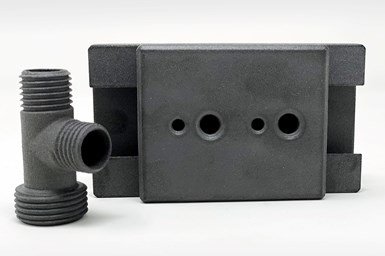Jabil’s PK 5000 Developed for Improved Strength, Chemical Resistance
The engineered material is also said to offer high barrier properties and low-moisture absorption, which may be critical for ensuring the quality and resilience of certain parts and products exposed to fuel and water.

Jabil PK 5000 is said to produce parts and prototypes with improved impact strength and greater chemical resistance compared to PA 12 and available polymer powders for selective laser sintering processes. Photo Credit: Business Wire
Jabil says its PK 5000 is an eco-friendly, powder-based additive material engineered to deliver improved strength, chemical resistance and resilience in comparison to general-purpose nylon materials, such as PA 12. The material has been formulated to support highly demanding automotive, consumer electronics, defense, medical and industrial manufacturing applications.
The company says this engineered material was developed to disrupt the market for powder bed fusion (PBF) technologies by improving upon existing polymers to offer enhanced processing and performance properties. With PK 5000, the company says it is introducing new innovations to meet a broad range of customer requirements while accelerating the adoption of additive manufacturing.
PK 5000 was created, tested and validated at Jabil’s Materials Innovation Center in Chaska, Minnesota, where polymer formulations, compound developments and material system integration are completed from start-to-finish under one roof. The company says experienced AM engineers, chemists, materials scientists and production experts leveraged Jabil’s innovations in materials science to oversee each step of the beaker-to-box process of developing customized powders and filaments — all under an ISO 9001-2015 quality management system.
The material is said to feature a unique combination of chemical and mechanical properties, such as high-impact strength, high-abrasion resistance and improved elongation over other nylon materials in order to withstand functional testing and use. Equally important, PK 5000 is also said to offer high-barrier properties and low-moisture absorption, which may be critical for ensuring the quality and resilience of certain parts and products exposed to fuel and water. Moreover, the polyketone resin used to make PK 5000 is an eco-friendly, low-carbon material made from carbon monoxide. The ability to leverage carbon monoxide, which is a leading cause of atmospheric pollution, may reduce overall carbon footprint, the company says.
Related Content
-
This Drone Bird with 3D Printed Parts Mimics a Peregrine Falcon: The Cool Parts Show #66
The Drone Bird Company has developed aircraft that mimic birds of prey to scare off problem birds. The drones feature 3D printed fuselages made by Parts on Demand from ALM materials.
-
Q&A With Align EVP: Why the Invisalign Manufacturer Acquired Cubicure, and the Future of Personalized Orthodontics
Align Technology produces nearly 1 million unique aligner parts per day. Its acquisition of technology supplier Cubicure in January supports demand for 3D printed tooling and direct printed orthodontic devices at mass scale.
-
Copper, New Metal Printing Processes, Upgrades Based on Software and More from Formnext 2023: AM Radio #46
Formnext 2023 showed that additive manufacturing may be maturing, but it is certainly not stagnant. In this episode, we dive into observations around technology enhancements, new processes and materials, robots, sustainability and more trends from the show.











